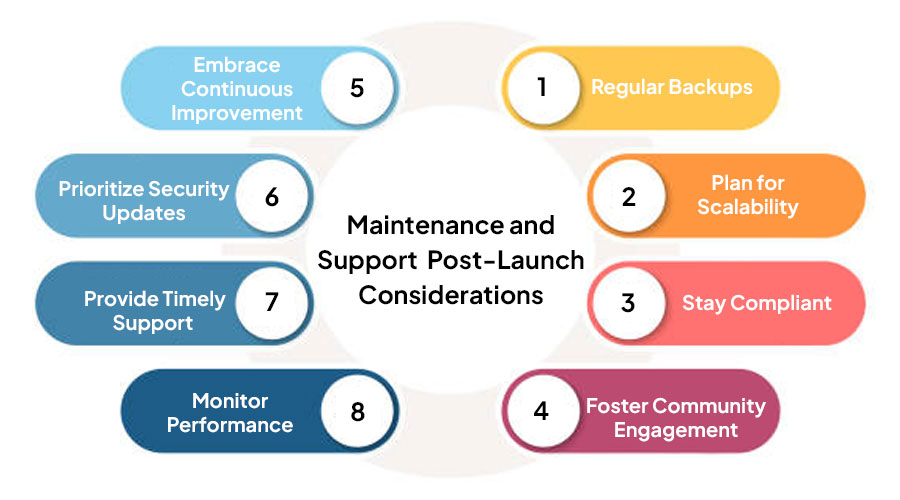Table of Contents
Introduction to Job Portal App Development
In today’s dynamic job market, where opportunities are abundant and talents are diverse, the need for efficient recruitment solutions has never been greater. Job portal applications have emerged as indispensable tools for both job seekers and employers, streamlining the hiring process and connecting the right talent with the right opportunities. In this comprehensive guide, we delve into the intricacies of job portal app development, exploring its significance, key features, development process, and future prospects.
Understanding Job Portal Apps:
Job portal applications serve as digital platforms that facilitate the exchange of job opportunities between employers and job seekers. They provide a centralized space where companies can post job vacancies, and individuals can search and apply for relevant positions. These apps offer various functionalities, including job search filters, resume uploading, application tracking, and communication channels between employers and candidates.
Significance of Job Portal Apps:
The significance of job portal apps lies in their ability to streamline the hiring process for both recruiters and job seekers. For employers, these apps simplify the task of sourcing and screening candidates, reducing the time and resources spent on recruitment. On the other hand, job seekers benefit from access to a wide range of job opportunities, personalized job recommendations, and tools to showcase their skills and experience effectively.
Key Features of Job Portal Apps:
- User Profiles: Job portal apps allow users to create profiles containing their personal information, education, work experience, skills, and preferences. These profiles serve as digital resumes and help recruiters assess candidates’ suitability for specific roles.
- Job Search and Filters: Users can search for job vacancies based on various criteria such as location, industry, job title, and salary range. Advanced search filters enhance the accuracy of job matching, enabling candidates to find positions that align with their qualifications and preferences.
- Resume Builder and Upload: Job portal apps often feature built-in resume builders or support the uploading of resumes in different formats. This functionality enables candidates to create professional resumes or import existing ones, making it easier for recruiters to evaluate their qualifications.
- Application Tracking: Candidates can track the status of their job applications through the app, providing transparency and eliminating the need for manual follow-ups. Similarly, recruiters can manage incoming applications, schedule interviews, and communicate with candidates within the platform.
- Communication Tools: Integrated messaging systems or chat functionalities facilitate communication between employers and candidates, allowing them to exchange information, clarify doubts, and schedule interviews seamlessly.
- Recommendation Engines: Machine learning algorithms analyze user data and behavior to provide personalized job recommendations, enhancing the job search experience and increasing the chances of finding suitable matches.
Development Process:
The development of a job portal app involves several stages, including planning, design, development, testing, and deployment. Here’s a brief overview of each stage:
- Planning: Define the app’s objectives, target audience, features, and monetization strategy. Conduct market research to identify competitors and trends.
- Design: Create wireframes and mockups to visualize the app’s layout, navigation, and user interface. Focus on intuitive design and seamless user experience.
- Development: Develop the app’s frontend and backend components, integrating features such as user authentication, job listing management, search algorithms, and communication tools.
- Testing: Conduct rigorous testing to identify and rectify bugs, performance issues, and compatibility issues across different devices and platforms.
- Deployment: Deploy the app to app stores (e.g., Apple App Store, Google Play Store) after thorough testing and optimization. Monitor user feedback and app performance post-launch.
Future Prospects:
The future of job portal apps looks promising, driven by advancements in technology and changing workforce dynamics. With the growing demand for remote work opportunities, niche job portals catering to specific industries or skill sets are likely to gain traction. Moreover, the integration of emerging technologies such as artificial intelligence, blockchain, and augmented reality can further enhance the functionality and effectiveness of job portal apps.
Understanding the Importance of Job Portal Apps
In today’s dynamic job market, where opportunities are abundant yet elusive, job portal apps stand as beacons of hope for both job seekers and recruiters alike. These digital platforms have revolutionized the way individuals seek employment and companies scout for talent. Understanding the importance of job portal apps is not merely a matter of convenience; it’s a strategic necessity in the contemporary professional landscape.
Bridging the Gap: Job portal apps serve as virtual bridges, connecting job seekers with prospective employers across various industries and geographic locations. Unlike traditional methods of job hunting, such as newspaper classifieds or physical resumes, these apps provide a centralized platform where individuals can browse through countless job listings with just a few taps on their smartphones. This accessibility expands job seekers’ horizons, offering them a plethora of opportunities beyond their immediate reach.
Streamlining the Recruitment Process: For employers, job portal apps streamline the recruitment process, offering a cost-effective and efficient means of talent acquisition. By leveraging advanced algorithms and filtering mechanisms, these platforms allow recruiters to sift through resumes and identify candidates whose skills and experiences align with their requirements. This not only saves time but also ensures a more targeted approach to hiring, ultimately leading to better recruitment outcomes.
Enhancing Visibility: In today’s digital era, visibility is paramount, both for job seekers and employers. Job portal apps provide a platform for individuals to showcase their skills, experiences, and accomplishments in a professional manner. Through detailed profiles and curated resumes, job seekers can attract the attention of recruiters actively seeking talent in their respective fields. Similarly, companies can enhance their brand visibility by promoting job openings and engaging with potential candidates on these platforms, thereby expanding their reach within the talent pool.
Facilitating Networking Opportunities: Networking is a cornerstone of career advancement, and job portal apps facilitate networking opportunities like never before. These platforms often feature built-in messaging systems and networking events, allowing professionals to connect with like-minded individuals, industry experts, and potential mentors. Whether it’s seeking career advice, exploring new opportunities, or expanding one’s professional circle, job portal apps serve as invaluable networking tools for individuals at every stage of their careers.
Embracing Diversity and Inclusion: Inclusivity is no longer just a buzzword; it’s a fundamental aspect of modern workplaces. Job portal apps play a pivotal role in fostering diversity and inclusion by democratizing the hiring process. By eliminating geographical barriers and unconscious biases, these platforms create a level playing field where individuals from diverse backgrounds can compete based on their merits. This not only benefits organizations by tapping into a broader talent pool but also promotes a culture of equity and fairness in the workforce.
User Registration and Profile Creation
In today’s digital landscape, user registration and profile creation are fundamental components of any online platform. Whether it’s a social media network, e-commerce site, or a specialized service, providing users with seamless registration and profile creation experiences is crucial for engagement and retention. In this guide, we’ll delve into the intricacies of user registration and profile creation, exploring best practices, optimization strategies, and the importance of these processes in driving user satisfaction and business success.
Understanding User Registration:
User registration marks the initial step in establishing a user’s identity within a digital platform. It’s the gateway through which individuals gain access to the features and functionalities offered by the platform. When designing a user registration system, simplicity and convenience should be prioritized. Complicated registration processes with excessive form fields or intrusive requirements can deter potential users and lead to high abandonment rates.
Key Elements of Effective User Registration:
- Simplified Forms: Keep registration forms concise, requesting only essential information such as username, email address, and password. Minimize the number of mandatory fields to streamline the process.
- Social Login Integration: Offer users the option to register or sign in using their existing social media accounts. This simplifies the registration process and reduces friction for users who may be wary of creating yet another set of credentials.
- Clear Call-to-Action: Utilize intuitive call-to-action buttons to guide users through the registration process. Clearly communicate the benefits of registration and highlight any incentives, such as exclusive access or personalized recommendations.
Optimizing Profile Creation:
Once users have successfully registered, the next step is to encourage them to complete their profiles. A complete profile not only provides valuable information for personalization and targeting but also fosters a sense of belonging within the community.
Strategies for Effective Profile Creation:
- Progressive Profiling: Instead of overwhelming users with a lengthy profile form upfront, consider implementing progressive profiling. Gather basic information during registration and gradually prompt users to complete their profiles over time through targeted prompts and incentives.
- Gamification: Inject elements of gamification into the profile completion process to make it more engaging. Award badges or points for profile completeness milestones, encouraging users to strive for a fully optimized profile.
- Personalization: Showcase the benefits of completing a profile by emphasizing the personalized experience users will receive in return. Tailor recommendations, content, and notifications based on user preferences and demographic information gathered through profile data.
The Importance of User Data Privacy and Security:
With great emphasis on user registration and profile creation comes the responsibility to safeguard user data. Prioritize data privacy and security measures to earn users’ trust and comply with regulatory standards such as GDPR and CCPA. Implement robust encryption protocols, secure authentication mechanisms, and transparent data handling practices to protect user information from unauthorized access or misuse.
Resume Building and Profile Enhancement Tools
In today’s competitive job market, having a polished resume and an impressive online profile is essential to stand out from the crowd. Whether you’re a recent graduate looking for your first job or a seasoned professional aiming for career advancement, leveraging the right tools can make all the difference. Let’s explore some top resume building and profile enhancement tools that can help you shine brighter in the eyes of potential employers.
- LinkedIn: Your Professional Online Identity LinkedIn is the go-to platform for professionals worldwide. It offers a range of features to enhance your profile, including sections for work experience, skills, education, and endorsements. Utilize LinkedIn to connect with industry peers, join relevant groups, and showcase your expertise through articles and posts. Regularly updating your LinkedIn profile ensures that you stay visible to recruiters and networking opportunities.
- Canva: Design Your Eye-Catching Resume Canva is a user-friendly graphic design platform that offers a plethora of resume templates. Whether you prefer a traditional layout or a more creative design, Canva has options to suit every taste. Customize your resume with Canva’s intuitive drag-and-drop interface, and impress recruiters with a visually appealing document that highlights your skills and experiences effectively.
- Grammarly: Perfect Your Writing Effective communication is crucial in any job application. Grammarly is a writing assistant tool that helps you eliminate grammar and spelling errors, improve sentence structure, and enhance the overall clarity of your resume and cover letter. With Grammarly’s AI-powered suggestions, you can ensure that your written communication reflects professionalism and attention to detail.
- VisualCV: Create Dynamic Visual Resumes VisualCV allows you to go beyond the traditional text-based resume by incorporating multimedia elements such as images, videos, and infographics. Showcase projects, presentations, and portfolio pieces directly within your resume to provide recruiters with a comprehensive view of your capabilities. VisualCV’s interactive format captures attention and leaves a lasting impression.
- Jobscan: Tailor Your Resume for Each Application Jobscan is a powerful tool that helps you optimize your resume for specific job postings. Simply upload your resume and the job description you’re targeting, and Jobscan will analyze the keywords and formatting to ensure alignment with the employer’s requirements. By tailoring your resume for each application, you increase your chances of passing through applicant tracking systems and catching the recruiter’s eye.
- Resumonk: Streamline Your Resume Creation Process Resumonk simplifies the resume building process with its user-friendly interface and customizable templates. Choose from a variety of professional designs, and effortlessly input your information using Resumonk’s guided editing tools. With options to export your resume in multiple formats, including PDF and Word, Resumonk empowers you to create polished resumes with ease.
- Portfolium: Showcase Your Work Portfolio Portfolium is a portfolio and career readiness network that allows you to showcase your projects, skills, and achievements in a visually engaging manner. Whether you’re a designer, developer, writer, or marketer, Portfolium provides a platform to highlight your best work and demonstrate your expertise to potential employers. With integration options for LinkedIn and other platforms, Portfolium amplifies your online presence and professional brand.
Communication Tools: Messaging and Interview Scheduling
In today’s fast-paced world, effective communication is crucial for the success of any business or organization. With the advent of technology, traditional methods of communication have evolved, giving rise to a plethora of tools and platforms designed to simplify and streamline interactions. Two such tools that have revolutionized the way we communicate are messaging applications and interview scheduling software.
Messaging applications have become ubiquitous in both personal and professional settings. From instant messaging to group chats, these platforms offer real-time communication capabilities that transcend geographical boundaries. Whether it’s exchanging quick updates with colleagues or collaborating on projects with remote teams, messaging apps provide a convenient and efficient way to stay connected.
One of the key advantages of messaging tools is their versatility. Users can communicate through text, voice, or even video, depending on their preferences and the nature of the conversation. This flexibility allows for seamless communication across different channels, ensuring that important messages are conveyed promptly and effectively.
Moreover, messaging applications often come with additional features that enhance productivity and collaboration. For example, file sharing capabilities allow users to easily exchange documents, images, and other media within the same platform. Similarly, integration with third-party apps enables users to streamline their workflows by accessing other tools directly from the messaging interface.
In the context of interview scheduling, these messaging tools play a crucial role in facilitating communication between recruiters and candidates. Instead of relying on traditional methods such as phone calls or emails, recruiters can use messaging platforms to coordinate interview timings, share relevant information, and provide updates throughout the hiring process. This not only saves time and effort but also ensures a smoother and more transparent experience for all parties involved.
However, effective communication is not just about exchanging messages—it’s also about managing time efficiently. This is where interview scheduling software comes into play. These tools automate the process of scheduling interviews by allowing recruiters to set availability preferences, send out invitations to candidates, and sync with their calendars in real-time.
One of the primary benefits of interview scheduling software is its ability to eliminate the back-and-forth communication typically associated with scheduling conflicts. By providing candidates with a selection of available time slots, recruiters can significantly reduce the time spent on coordinating schedules manually. This not only improves the candidate experience but also frees up valuable time for recruiters to focus on other aspects of the hiring process.
Furthermore, interview scheduling software often comes with advanced features such as automated reminders, customizable templates, and analytics dashboards. These functionalities not only streamline the scheduling process but also provide valuable insights into recruitment metrics, allowing organizations to optimize their hiring strategies over time.
Employer Features: Job Posting and Application Management
In today’s dynamic job market, efficient recruitment processes are pivotal for businesses striving to attract top talent. Among the array of tools available, robust employer features for job posting and application management stand out as indispensable. Let’s delve into these essential features, understanding how they streamline recruitment efforts and elevate the hiring experience.
- Intuitive Job Posting Interface: The cornerstone of effective recruitment begins with a user-friendly job posting interface. Employers need a platform that allows them to effortlessly create and customize job listings, specifying key details such as job title, description, requirements, and location. An intuitive interface saves time and ensures accuracy, enabling employers to reach their desired audience effectively.
- Multi-Channel Distribution: Maximizing reach is vital in attracting a diverse pool of candidates. Employer features that facilitate multi-channel distribution empower businesses to broadcast job openings across various platforms, including company websites, job boards, social media channels, and industry-specific forums. This comprehensive approach enhances visibility and engagement, amplifying the chances of finding the perfect fit for the role.
- Customizable Application Forms: Tailoring application forms to suit specific job requirements is paramount for efficient screening and evaluation. Advanced employer features offer customizable templates that enable employers to craft targeted questions, assess relevant skills, and gather pertinent information from applicants. This customization fosters a more insightful selection process, ensuring that only qualified candidates progress to the next stage.
- Automated Screening Tools: Sorting through a high volume of applications can be overwhelming without the right tools. Automated screening features utilize predefined criteria to filter incoming applications, flagging those that closely match the job requirements. By automating this initial screening process, employers can focus their attention on candidates who are the best fit, saving time and resources while maintaining quality standards.
- Collaborative Candidate Management: Effective collaboration is key to a seamless recruitment journey. Employer features that facilitate collaborative candidate management empower hiring teams to streamline communication, share feedback, and track candidate progress in real-time. This collaborative approach fosters synergy among team members, expediting decision-making and ensuring a cohesive hiring process.
- Candidate Relationship Management (CRM): Building and nurturing candidate relationships is crucial for long-term talent acquisition strategies. Advanced employer features incorporate CRM functionalities that enable businesses to maintain a database of prospective candidates, track interactions, and engage with talent proactively. By fostering meaningful connections with candidates, businesses can cultivate talent pipelines and enhance their employer brand.
- Analytics and Reporting: Data-driven insights are invaluable for optimizing recruitment strategies and measuring success. Employer features equipped with robust analytics and reporting capabilities provide actionable metrics on various aspects of the hiring process, such as application conversion rates, time-to-fill, and source effectiveness. Armed with these insights, employers can make informed decisions, identify areas for improvement, and drive continuous optimization.
Payment Gateway Integration for Premium Services
In today’s digital era, businesses offering premium services strive to provide seamless and convenient transactions for their customers. One essential component that facilitates this process is payment gateway integration. This technological solution not only streamlines payments but also enhances customer satisfaction and boosts revenue streams.
Payment gateway integration refers to the process of linking a merchant’s website or application with a payment processor, enabling secure online transactions. For businesses offering premium services, this integration holds immense significance due to several compelling reasons.
First and foremost, seamless payment processing is crucial for maintaining customer trust and loyalty. Premium services often come with higher price tags, which necessitates a smooth and secure payment experience. A reliable payment gateway ensures that transactions are processed efficiently, minimizing the risk of technical glitches or security breaches. This instills confidence in customers, encouraging repeat purchases and fostering long-term relationships.
Moreover, payment gateway integration offers flexibility in accepting various payment methods. Whether it’s credit/debit cards, digital wallets, or alternative payment options, businesses can cater to diverse customer preferences. By accommodating multiple payment channels, businesses can expand their reach and appeal to a broader audience, ultimately driving sales and revenue growth.
Furthermore, security is paramount when dealing with premium services and sensitive financial information. A robust payment gateway employs advanced encryption techniques and compliance standards to safeguard transaction data against unauthorized access or fraud. This not only protects the interests of both businesses and customers but also upholds regulatory requirements, fostering a trustworthy brand reputation.
Additionally, payment gateway integration facilitates seamless subscription and recurring billing models for premium services. Whether it’s monthly memberships, annual subscriptions, or tiered pricing plans, businesses can automate billing cycles and ensure timely payments from customers. This eliminates manual intervention, reduces administrative overhead, and enhances operational efficiency.
From a strategic standpoint, payment gateway integration provides valuable insights into customer behavior and purchasing patterns. Through analytics and reporting features, businesses can gain actionable intelligence to optimize pricing strategies, tailor marketing campaigns, and improve overall service offerings. This data-driven approach enables businesses to stay competitive in a dynamic marketplace and stay attuned to evolving customer needs.
Security and Data Privacy Considerations
In our rapidly evolving digital landscape, where information flows freely and data reigns supreme, the importance of security and data privacy cannot be overstated. Whether you’re a business owner, a technology enthusiast, or an everyday internet user, understanding and implementing robust security measures is paramount to safeguarding sensitive information and preserving digital privacy. In this article, we delve into the essential considerations for fortifying your digital fortress against cyber threats and ensuring data privacy.
Understanding the Landscape: The first step in bolstering security and data privacy is understanding the current threat landscape. Cyberattacks are becoming increasingly sophisticated, ranging from ransomware and phishing schemes to data breaches and identity theft. Moreover, with the proliferation of connected devices and the advent of the Internet of Things (IoT), the attack surface has expanded, presenting new challenges for securing networks and protecting data.
Implementing Strong Authentication: One of the cornerstones of effective security is implementing strong authentication mechanisms. Passwords alone are no longer sufficient to thwart determined attackers. Employing multi-factor authentication (MFA), which combines something you know (e.g., a password) with something you have (e.g., a mobile device), adds an extra layer of protection against unauthorized access. Additionally, biometric authentication, such as fingerprint or facial recognition, offers a convenient and secure way to authenticate users.
Encryption: Shielding Your Data Encryption serves as a powerful tool for protecting sensitive data from prying eyes. By encoding information in such a way that only authorized parties can decipher it, encryption ensures confidentiality and integrity during data transmission and storage. End-to-end encryption, which encrypts data from the sender to the recipient, is particularly crucial for maintaining privacy, especially in communication platforms and cloud storage services.
Embracing Security Best Practices: Adhering to security best practices is essential for mitigating risks and minimizing vulnerabilities. This includes regularly updating software and operating systems to patch known security flaws, conducting thorough security assessments and audits, and fostering a culture of security awareness among employees. Furthermore, implementing access controls and least privilege principles ensures that users only have access to the resources necessary for their roles, reducing the potential impact of security breaches.
Data Privacy Compliance: With the enactment of stringent data privacy regulations such as the General Data Protection Regulation (GDPR) and the California Consumer Privacy Act (CCPA), organizations must prioritize compliance to avoid hefty fines and reputational damage. This entails obtaining explicit consent before collecting personal data, implementing data protection measures, such as pseudonymization and anonymization, and providing individuals with transparency and control over their data.
Top Job Portal App Development Companies
In today’s digitally-driven world, job hunting has evolved from scouring newspapers to scrolling through job portals on smartphones. The demand for user-friendly and efficient job portal applications has surged, paving the way for innovative app development companies to step in and revolutionize the employment landscape. Let’s delve into the realm of job portal app development and explore the top companies at the forefront of this transformation.
-
-
Next Big Technology:

Focus Area
- Mobile App Development
- App Designing (UI/UX)
- Software Development
- Web Development
- AR & VR Development
- Big Data & BI
- Cloud Computing Services
- DevOps
- E-commerce Development
Industries Focus
- Art, Entertainment & Music
- Business Services
- Consumer Products
- Designing
- Education
- Financial & Payments
- Gaming
- Government
- Healthcare & Medical
- Hospitality
- Information Technology
- Legal & Compliance
- Manufacturing
- Media
-
- Fueled: Elevating Job Search with Innovative Designs Fueled is synonymous with creativity and innovation in the realm of app development, and their foray into job portal applications is no exception. With a team of talented designers and developers, Fueled delivers bespoke solutions tailored to meet the unique requirements of clients. Their emphasis on sleek designs and intuitive interfaces ensures that job seekers can navigate through listings effortlessly, while employers can efficiently manage their recruitment needs.
- Mindinventory: Empowering Employment Connections Mindinventory has carved a niche for itself as a trusted provider of job portal app development services, empowering businesses to connect with top talent seamlessly. Their comprehensive approach encompasses everything from robust backend systems to engaging frontend interfaces, resulting in powerful and user-friendly applications. With a keen understanding of market trends and technological advancements, Mindinventory consistently delivers solutions that exceed expectations.
- Konstant Infosolutions: Driving Digital Transformation in Recruitment Konstant Infosolutions has established itself as a key player in the realm of digital transformation, with its expertise extending to job portal app development. Leveraging the latest technologies such as AI and machine learning, Konstant Infosolutions creates intelligent job portals that match candidates with relevant opportunities efficiently. Their commitment to innovation and excellence has earned them a reputation for delivering solutions that drive real results.
- WillowTree: Redefining the Future of Job Search WillowTree is renowned for its ability to create immersive digital experiences that resonate with users, and their work in job portal app development is no exception. By combining cutting-edge design with robust functionality, WillowTree crafts job portals that stand out in a crowded market. Their focus on user-centric design ensures that every aspect of the application is tailored to enhance the job search experience, making them a top choice for businesses seeking to revolutionize recruitment.
FAQs On Job Portal App Development
In today’s digital age, where technology is omnipresent, job portal app development has emerged as a crucial avenue for connecting job seekers with potential employers. As businesses evolve, so do the methods of recruitment, and job portal apps have become indispensable tools for both job seekers and recruiters alike. However, navigating through the intricacies of developing a job portal app can be overwhelming for many. To shed light on this topic, let’s delve into some frequently asked questions (FAQs) surrounding job portal app development.
1. What is a job portal app, and how does it work? A job portal app is a mobile application designed to facilitate the process of job search and recruitment. It allows job seekers to create profiles, search for relevant job openings, and apply for positions directly through the app. Recruiters, on the other hand, can post job listings, search for candidates, and manage the hiring process seamlessly.
2. What are the key features of a job portal app?
- User Registration and Profiles: Users should be able to create accounts, complete profiles, and upload resumes.
- Job Search and Filters: An intuitive search functionality with filters based on location, industry, experience, etc.
- Job Posting and Management: Employers should be able to post job listings, manage applications, and communicate with candidates.
- Notifications: Push notifications to keep users updated on new job postings, application status, and other relevant information.
- Resume Builder: Tools for creating and editing resumes within the app.
- Messaging: In-app messaging for seamless communication between job seekers and recruiters.
- Analytics: Insights for recruiters to track the performance of job listings and optimize their recruitment strategies.
3. How can I monetize a job portal app? There are several monetization strategies for job portal apps, including:
- Premium Subscriptions: Offering premium features or access to exclusive job listings for a subscription fee.
- Featured Listings: Charging employers to highlight their job postings for increased visibility.
- Advertising: Displaying targeted advertisements to users based on their job preferences and behavior.
- Referral Fees: Partnering with recruitment agencies or educational institutions and earning a commission for successful referrals.
4. What technologies are used in developing a job portal app? Job portal apps are typically built using a combination of front-end and back-end technologies. Front-end technologies may include HTML, CSS, and JavaScript for the user interface, while back-end technologies often involve frameworks like Node.js, Ruby on Rails, or Django for server-side development. Additionally, databases such as MySQL or MongoDB are used for storing user and job data, and APIs may be integrated for features like job search and notifications.
5. How can I ensure the security of user data in a job portal app? Security is paramount in job portal app development to protect sensitive user information. Implementing encryption techniques, secure authentication mechanisms (such as OAuth or JWT), and regular security audits can help mitigate risks. It’s also essential to comply with data protection regulations like GDPR or CCPA and prioritize user consent and transparency regarding data usage.
6. What are the challenges in developing a job portal app? Some common challenges in job portal app development include:
- Data Management: Handling large volumes of user and job data efficiently.
- User Experience: Ensuring a seamless and intuitive user experience across different devices and platforms.
- Scalability: Designing the app architecture to accommodate growth in user base and data.
- Competition: Standing out in a crowded market with unique features and effective marketing strategies.
- Monetization: Finding the right balance between user engagement and revenue generation without compromising user experience.
Thanks for reading our post “Job Portal App Development: Cost & Key Features”. Please connect with us to learn more about Best Job Portal App Development.















